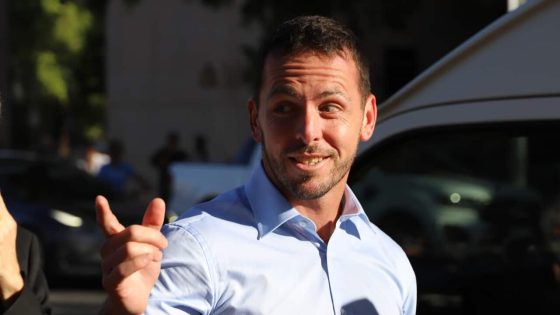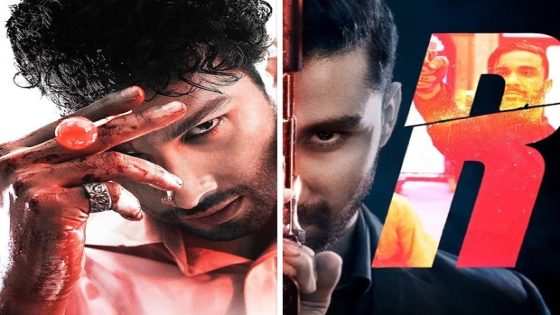Explosive testimony at the coronial inquest into Kumanjayi Walker’s death has heard how Zachary Rolfe worked with media outlets to rehabilitate his image after he was found not guilty of the Warlpiri teenager’s murder in 2022.
Former police officer Zachary Rolfe was unanimously acquitted on all charges by the NT Supreme Court following an extensive murder trial.
However Mr Rolfe has been compelled to return to Central Australia to give evidence at the coronial investigation, which is investigating the night 19-year-old Walker was shot and killed in the Aboriginal community of Yuendumu and its aftermath.
Counsel assisting Dr Peggy Dwyer detailed the discussions between Mr Rolfe and a journalist about the writing of a sympathetic story on him and the fatal incident.
“You gave an account of what had happened to an Australian journalist [for The Australian] by the name of Kristen Shorten, is that right?”
“Yes,” Mr Rolfe said.
“And you knew that in speaking to Ms Shorten you had a very sympathetic journalist,” Dr Dwyer asked.
“Yes,” Mr Rolfe replied.
The court heard journalist Ms Shorten was a friend of Zachary Rolfe’s, and was married to another serving officer.
Texts between the pair were read out in the coroner’s court.
“Hubby is on the way down there today, so glad you’re okay, could have been much worse, I know what you did was totally warranted” read Ms Shorten’s text to Mr Rolfe.
Dr Dwyer also read later texts where the reporter offers to help Mr Rolfe.
“If you ever want me to write an article in your defense, with or without naming you, just say the word,” Kirsten Shorten’s text read.
Counsel suggests Rolfe fabricated pivotal evidence
Counsel Assisting the Coroner Dr Peggy Dwyer has suggested Rolfe fabricated pivotal evidence. Source: Supplied
Dr Dwyer also told the court the evidence Mr Rolfe gave about Kumanjayi Walker reaching for the gun, which was pivotal in the NT Supreme Court Case.
“There’s nothing in that [police] notebook entry about Kumanjayi Walker putting his hand on your, gun is there?”
“No there’s not,” Mr Rolfe agreed.
Dr Dwyer put it to Rolfe that he had also failed to mention it in the interview Ms Shorten less than a month after he had shot Kumanjayi Walker, and suggested he had fabricated the story to help with his trial.
At the inquest today, Mr Rolfe vehemently denied he had made up evidence, saying he had just forgotten.
“If you bring an expert in memory in regard to critical incidents they can explain how things like this can happen,” Mr Rolfe said.
Using media as a ‘tool’
Mr Rolfe also gave evidence on how he used the media as a “tool” to defend himself throughout the NT Supreme Court trial and after it.
“In hindsight I wish I’d never spoken to the media because in trial we were able to prove my innocence and the media was not required,” Rolfe said.
“The media was a tool that was … sometimes used against me, and then sometimes I utilised the media as a tool as well.”
“There was no need for that, and in hindsight I wish I never did it.”
“You utilised the media as a tool not just for the trial, you utilised it after the trial didn’t you, on a number of occasions?” Dr Dwyer asked.
“Correct,” Mr Rolfe confirmed.
The coroner’s court today heard recordings from a daily video diary that Mr Rolfe recorded for a commercial television station during his NT Supreme court murder trial.
In the recording Mr Rolfe can be seen sitting on a couch, responding to testimony provided by two Police Officers Constable Chris Hand and Senior Constable Lanyon Smith on their attempted arrest of Kumanjayi Walker when the teenager brandished an axe and was able to escape.
“Today we heard from Chris Hand and Lanyon Smith, they are the boys that dealt with the axe incident on Wednesday 6 November,” Rolfe says in the recording.
“It’s a bit frustrating to be in court when you know you’re listening to these lads and you know they are saying the wrong things, not telling the whole truth and you’ve just got to sit there silently, you can’t correct them,” he continues in the video.
Mr Rolfe appears to further criticise their testimony, ending the recording by saying, “F*ck them mate, that’s me for the day … f*ck Hand and f*ck Smith.”
Transcripts from a follow up interview Mr Rolfe gave to the same channel was also read at the inquest today, with Mr Rolfe quoted as saying, “I have called those two men cowards, and I don’t believe they are cowards for their actions on that night, I believe they are cowards for their actions afterwards.”
“Officers Hand and Smith gave evidence under oath in a Supreme Court Trial, you understood that?” Counsel Assisting Dr Peggy Dwyer asked Rolfe.
“Yes,” Mr Rolfe confirmed.
“But because the evidence didn’t suit you, you went on the attack in relation to both of those witnesses,” Dr Dwyer stated.
“Because their evidence I don’t believe is true,” Mr Rolfe explained.
“Do you think it’s appropriate for you, at that stage a serving member of the Northern Territory, you were talking about two officers who had given evidence under oath, and you decided to go and record for a television program criticism of those officers saying ‘f**k them, f**k them for giving evidence that didn’t suit my story at trial?'” Dr Dwyer questioned.
“Yes, because at that time I had gone through the entire paperwork of the investigation against me, I think I made it clear that my view of the investigation was incompetent if not malicious and I was preparing for the potentiality that due to that incompetence or maliciousness I would go to jail for 25 years,” Mr Rolfe told the court.
Mr Rolfe said his media attack was justified under the circumstances because he was trying to protect himself from what he believed was an injustice, but said on reflection he should have trusted in the court process.
“I was preparing for my truth to come out to hopefully correct the course of justice.”
Mr Rolfe denied knowing about vicious social media campaigns hounding a member of the police force who had spoken out against him in the coronial inquest.
He also denied that allegations of shocking racism in the NT Police Force were an attempt to discredit another police member who had provided evidence that might have been seen as negative.
“If someone is on your side you vigorously defend them don’t you?” Dr Peggy Dwyer asked.
“If they are good people in the right yes,” Mr Rolfe said.
“But if someone is prepared to disagree with you or give evidence that doesn’t support you … your attitude is , I’m quoting, ‘F*ck them’?” Dr Dwyer said.
“My attitude is I am completely willing to call out people who I believe are wrong,” Mr Rolfe replied.
Evidence at the inquest continues.




